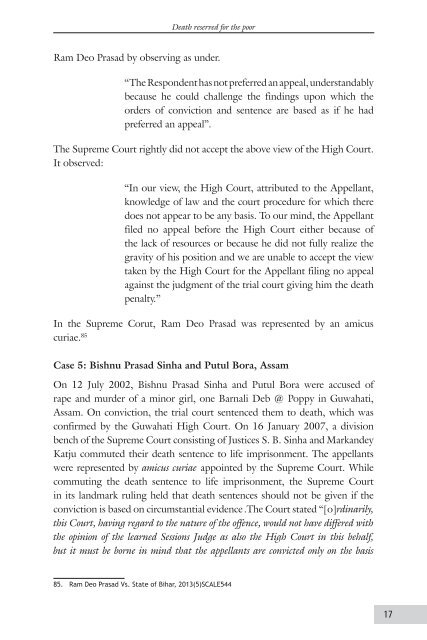Create successful ePaper yourself
Turn your PDF publications into a flip-book with our unique Google optimized e-Paper software.
Death reserved for the poor<br />
Ram Deo Prasad by observing as under.<br />
“The Respondent has not preferred an appeal, understandably<br />
because he could challenge the findings upon which the<br />
orders of conviction and sentence are based as if he had<br />
preferred an appeal”.<br />
The Supreme Court rightly did not accept the above view of the High Court.<br />
It observed:<br />
“In our view, the High Court, attributed to the Appellant,<br />
knowledge of law and the court procedure for which there<br />
does not appear to be any basis. To our mind, the Appellant<br />
filed no appeal before the High Court either because of<br />
the lack of resources or because he did not fully realize the<br />
gravity of his position and we are unable to accept the view<br />
taken by the High Court for the Appellant filing no appeal<br />
against the judgment of the trial court giving him the death<br />
penalty.”<br />
In the Supreme Corut, Ram Deo Prasad was represented by an amicus<br />
curiae. 85<br />
Case 5: Bishnu Prasad Sinha and Putul Bora, Assam<br />
On 12 July 2002, Bishnu Prasad Sinha and Putul Bora were accused of<br />
rape and murder of a minor girl, one Barnali Deb @ Poppy in Guwahati,<br />
Assam. On conviction, the trial court sentenced them to death, which was<br />
confirmed by the Guwahati High Court. On 16 January 2007, a division<br />
bench of the Supreme Court consisting of Justices S. B. Sinha and Markandey<br />
Katju commuted their death sentence to life imprisonment. The appellants<br />
were represented by amicus curiae appointed by the Supreme Court. While<br />
commuting the death sentence to life imprisonment, the Supreme Court<br />
in its landmark ruling held that death sentences should not be given if the<br />
conviction is based on circumstantial evidence .The Court stated “[o]rdinarily,<br />
this Court, having regard to the nature of the offence, would not have differed with<br />
the opinion of the learned Sessions Judge as also the High Court in this behalf,<br />
but it must be borne in mind that the appellants are convicted only on the basis<br />
85. Ram Deo Prasad Vs. State of Bihar, 2013(5)SCALE544<br />
17


